Luca Guadagnino @ 50: A Trilogy of Desire
 Wednesday, August 11, 2021 at 4:53PM
Wednesday, August 11, 2021 at 4:53PM Happy belated 50th to Luca Guadagnino.
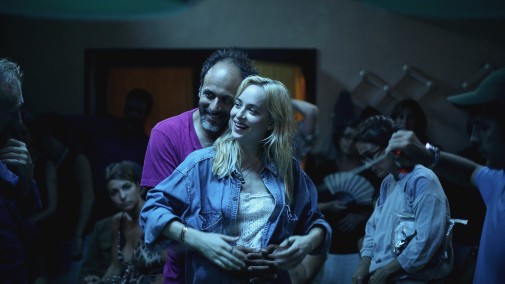
Like many a director in film history, Luca Guadagnino's cinema is characterized by common themes, through lines transversal to all his works, though more evident in some than others. During the release and promotional tour of Call Me By Your Name, the Italian auteur came to realize that his last three films could be construed as an unofficial trilogy of desire, though he later repudiated the notion. Nevertheless, akin to Bergman's Silence of God tercet, Guadagnino's I Am Love, A Bigger Splash, and Call Me By Your Name complete a three-part thesis in cinematic form. Instead of the Swedish master's spiritual dread, we have a multifaceted portrait of human desire as a force so great it's both overwhelming and life-changing, magical and terrifying, a blessing, a curse, perchance a deliverance…
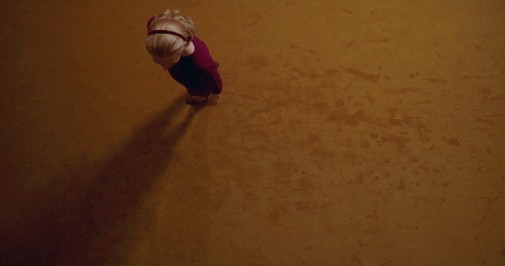
These films, released in theaters in 2010, 2016 (both after festival runs the year prior), and 2017, represent three different sorts of text, though their final shape can't help but be connected. The first is an original story that plays with classical archetypes and a tradition of filmed melodrama. The middle picture purports to adapt a novel by Alain Page to the screen, but it's more accurately described as the remake of a French classic. Finally, the last example transfigures one highly literary book by André Aciman into an experience of immersive sensualist cinema, more concerned with pure feeling and inchoate tones than the specific wording of its source. Guadagnino thus explored narratives that sometimes defy logic, ruled as they are by the wills and wiles of a desiring mind. The call of Eros dilacerates any hint of sense from the characters, the camera, and the audience.
If one were to look at I Am Love with a hard heart and calculated coldness, it's possible to conclude that the film is a bit disjointed, hinged on clichéd tropes and explosions of style that only highlight the fractured nature of its structure. That being said, I love it wholeheartedly and have done so since watching it in 2010, when I was 15 and had my world shaken by Tilda Swinton's orgasmic reaction to the taste of prawns. Starting to the sound of John Adams' bombastic music, I Am Love's first chapters capture a snowbound Milan on the cusp of a new millennium. As we move from the wintery outdoors to interiors of aristocratic grandeur, the picture's protagonist reveals herself to us. She's Emma Recchi, the Russian wife of a wealthy industrialist. On this occasion, she's playing host to a noble dinner whereupon the clan's paterfamilias will concede the reins of the business to the family's younger men.
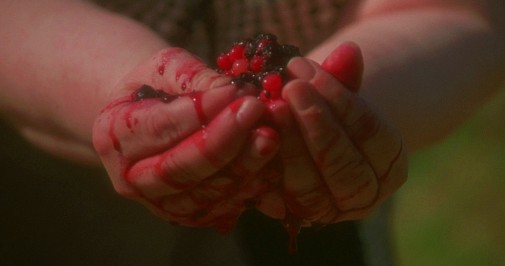
Emma's swirling sense of self, her wants, and capitulating refusals are at the center of I Am Love. Tilda Swinton and the director spent almost a decade gestating the project, finally coalescing their ideas on a tale about how their heroine finds liberation through consummated lust. Emma falls for her son's best friend, a handsome chef, as beguiled by his sexual body as by his hedonistic cuisine. Yorick Le Saux's curious camera and Walter Fasano's editing disperse the audience's attention and envelop it in the subjectivity of Emma, regularly losing sight of the action to concentrate on the details of Oscar-nominated costumes, flowers, sweaty bodies, and more. It's epicurean cinema at its most unashamed. The sensations it elicits verge on pornography though the images are never that graphic.
The spectator understands Emma, her airless world of marble and old wealth, and her stilted existence by this robust formalistic style. Even as the actions that move the narrative forward disintegrate in a tidal wave of irrationality, it's impossible to look down on the melodrama. In her pursuit of desire, Emma loses everything she had built, and she has an active hand in the destruction. However, while ending the story in funereal garb, tears, an evasion, Guadagnino doesn't allow the conclusion to be anything other than triumphant. To further underline this paradoxical quality, a nearly abstract glimpse of naked bodies loving each other in a cave evokes a sense of primordial carnality, something so powerful it begets total submission to its majesty. Instead of regarding the players with judgment, the camera looks at their actions with awe.
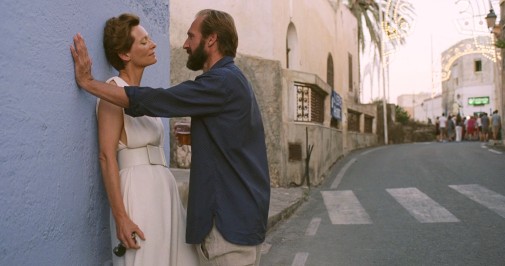
Also set by the Mediterranean Sea, starring Swinton and featuring a pool cum watery grave, A Bigger Splash is the messiest of these pictures by quite a margin. Remaking Jacques Deray's La Piscine (which is, incidentally, now streaming on the Criterion Channel), Guadagnino tells the story of Marianne, a rock star who, while taking a curative rest in contemporary Italy, invites a man from her past and his teenage daughter for a tumultuous stay. The appearance of past lovers causes the intromission of disruptive memories and half-forgotten desires into the life of this voiceless chanteuse. Does she want contentment or the caustic ecstasy of days gone by, things that can't be recaptured? After a while, one gets a sense that the protagonist and all other characters that orbit around her realize they're headed towards mutually assured destruction. Still, they can't do anything about it. Their bodies demand a libation of pleasure. So do their hearts.
They surrender, and they suffer in pained bliss, waking up to the reality of sunken crimes, loss, grief. And yet, even then, Guadagnino's camera doesn't judge. How can it do so when the movie's gaze was as enchanted as its characters'? If they are hypnotized by the sensuous possibilities that engulf them, so are we. Costume designer Giulia Piersanti, Le Saux, and Ralph Fiennes are the MVPs in this heady descent into chaos birthed out of sexual games. There's both great exuberance and elegant contention to their efforts, a willingness to peruse the limits of absurdity while always keeping their feet planted on a base of erotic realism. With each picture, it's like Guadagnino's cinema becomes more material, earthy. Yet, at the same time, the camera also pulls toward the domain of abstract sensation over physical experience.
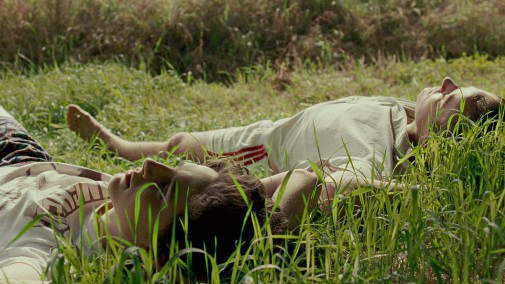
Call Me By Your Name concludes this evolution with the story of an American teenager falling for his father's student during an Italian summer holiday. The first film was about the ignition of desire. The second about trying to recapture the ghost of pleasure. As for the Aciman adaptation, it focuses on the cherishing of what once was but is no more - desire contently remembered. Perhaps because of it, it's the only film in the trilogy in which that force and all its consequences are ultimately seen as treasurable things, non-destructive, valuable beyond their sheer beauty. There's some irony here, considering that the film about a teenager ends up being the most preeminently mature. But, of course, one should remember how the book is a recollection of erstwhile sexual connection instead of a description of in-the-moment passion.
So much so that James Ivory's first drafts included significant amounts of voice-off narration, passages from Aciman's prose that assured the viewer that Call me By Your Name is a grown man's bittersweet memory about the long-gone events of Summer 1983. Guadagnino cut it out of the screenplay, letting the cinematic image indicate those ideas rather than telegraphing them through textual elements. It was a risky gambit, but it paid off. Trading Yorick Le Saux for Sayombhu Mukdeeprom, Bordighera for Crema, the director created one of the most beautiful pictures of the 2010s. Call Me By Your Name is so finely photographed, so pictorially gorgeous, that it is almost as if the artists have crystalized desire in 16mm celluloid film. Furthermore, the movie's a masterpiece of performance, making every averted gaze count, every touch of skin and look from across the room feel like a tectonic shift in the character's lives. Neither Timothée Chalamet nor Michael Stuhlbarg have ever been better, for example.

Bringing this reverie down to a more personal paradigm, one must confess some things. Before watching Call Me By Your Name, I was already a big fan of the book and found many passages eerily representative of my own thoughts and apprehensions. A particular meditation on how the anxiety over future souvenirs can rob present moments of their vitality has stayed with me for years. Because of that, I was hopeful but skeptical, fearing it would never be able to translate the internal musings of the book or that it would do it through non-cinematic means. Instead, Luca Guadagnino's direction was the most joyful of surprises, capturing the feelings the written word had elicited while never betraying the sanctity of the big screen, its particularities, and capricious limitations. Indeed, dedicated to Bernando Bertolucci, Jean Renoir, Jacques Rivette, Éric Rohmer, André Techiné, is a product of its director's cinematic loves.
During my first brush with the film, I was also living through some experiences not too unlike the ones depicted in it, a potent cocktail of self-identification that made Call Me By Your Name hit like a sledgehammer to the solar plexus. My attachment to it is visceral and profound, and while I think some of Luca Guadagnino's other films are better, this shall forever remain my favorite. So to celebrate the Italian director's 50th birthday, let's remember the messy perfection of his Trilogy of Desire and give ourselves to its absolute pleasures.
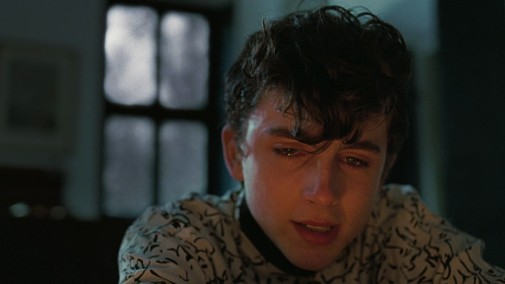
I Am Love, A Bigger Splash and Call Me By Your Name are all available to rent or stream.
Related:
Jason on Guadagnino's second little seen movie Melissa P
Chris on the music of A Bigger Splash
Michael on I Am Love
Cláudio on the costumes of Suspiria
Carlos personal history with Call Me By Your Name



Reader Comments (4)
Lovely writing that uses strong personal experience to cover any flaws or expectedness you may encounter. Guadagnino's films are always ones that linger and make one think about long after viewing, whether one loved it or wasn't sure they even liked it all that much.
Few contemporary directors films are recognizable within the opening moments, of being uniquely their work and vision. Guadagnino is one of these few I sense during the opening credits.
Ad your writing is as uniquely brilliant, and recognizably so, in your opening sentences Claudio.
A Bigger Splash always. I just recently rewatched it as part of a double feature with the recently Criterion’d La piscine and their collective and hypnotic sumptuousness just sent me to nirvana.
Ralph Fiennes’s performance is the most egregious supporting snub from the last decade. That man is a hurricane in ABS. Dakota Johnson is so good, too, making a cipher fully blooded; I still understand nuances of Penelope in repeat viewings. And how he captures Italy! Or curates his soundtracks! Ugh, I don’t need to say more.
I Am Love is gorgeous, too, but I have issues with its last act (save for the delicious ending set to ear-deafening John Adams), and as much as I genuinely love CMBYN, I also fully believe it’s too precious for its own good, and squanders the carnality and sexuality present in the novel for the sake of preserving what Guadagnino himself called his “Disney movie.”
One of my favorite parts of the novel was Elio sniffing Oliver’s shorts like the little horny shit he is, but the film fails to really capture Elio’s many idiosyncrasies about sex and its fluids, smells, tastes, save for one sassy little pseudo-hump on the bed with the shorts on his head (but no sniffing), and his surprised delight at Oliver biting his foot after his nosebleed.
I could go on and on, haha, but Guadagnino DID make A Bigger Splash, so I can forgive a lot.
Oh oh. There's another Dan out there. This is gonna get messy. (The only one of these three I really love is the first film. Agree the second is "messy". Like, but don't love, CMBYN.) Great article, though. The Dans agree on that.